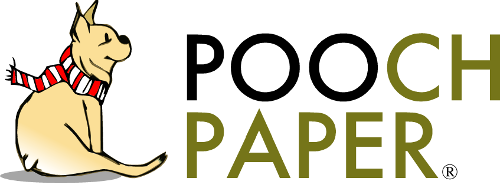MADE IN THE USA
Pooch Paper is a PFAS-Free, non-chlorine bleached paper alternative to single-use plastic dog waste bags.
Our sheets are biodegradable, compostable and are manufactured using renewable energy. Our fluorochemical-free, oil and grease resistant coating is made naturally during the pulp drying process in order to ensure dog waste remains inside the paper and not on your hand.
THE PROBLEM
THERE ARE AN ESTIMATED 22 BILLION POUNDS OF DOG WASTE DROPPED IN US LANDFILLS EACH YEAR.
While not all dog parents pick up after their dogs, roughly ten million tons of dog waste and over 500 million plastic doggie bags end up in US landfills each year.
Most doggie parents have become sensitive to the growing awareness around single-use plastics, and have begun to consider how dog waste bags play into this environmental concern. Some pet parents have chosen to “up cycle,” or reuse plastic bags that come from the grocery market, for example. Others use oxo-biodegradable plastic bags, which purport to be eco-friendly. The latest initiative to hit the dog waste bag market includes bioplastics.
While all of these efforts are one step closer to being eco-friendly, there still remains one common denominator across all of these categories: plastic.
Plastic is generally not biodegradable - it can take over 500 years to degrade, if it ever does. Some bags are manufactured as oxo-biodegradables, meaning that a formula (typically called EPI) is added during the manufacturing process to enable the plastic to break down quicker. However, oxo-biodegradables often do not fully disappear. Instead, they break down into millions of micro-plastic particles that enter the air we breathe, the water we drink and ultimately the food supply we consume.
Such micro-plastic particles may, among other things, carry toxic or carcinogenic chemicals used in making the plastic, or they can act as a carrier for pathogens and heavy metals.
OUR PLANET AND OUR PUPS ARE MADE TO BE LOVED!
In 2019 National Geographic released a study, Microplastics are Raining Down from the Sky, following an air quality research project conducted in remote mountain locations furthering this point. In 2020, Consumer Reports published their findings suggesting that humans ingest a credit card-sized amount of plastic each week due to increasing micro-plastic pollution.
If standard plastic and oxo-biodegradables are dangerous to sustainability, what about bioplastics?
Bioplastics have recently entered the marketplace in an effort to replace fossil fuels with renewable resources such as corn, starch and other proteins in the manufacturing process. In this case, bioplastics are capable of breaking down under controlled environmental conditions such as exposure to sunlight and moisture - two factors nearly impossible to guarantee or control when disposed of in a landfill.
Additionally, the combination of plastic and animal waste amidst compressed garbage in landfills results in the emission of methane gas into the air - which, as a greenhouse gas, absorbs the sun’s heat, thereby warming the atmosphere and adversely affecting the climate. The release of large quantities of methane gas is especially problematic in studies that show that, within the first two years of emission, methane can be measured around 84 times more potent than carbon dioxide.
WHAT IS AN ECO-CONSCIOUS PET PARENT SUPPOSED TO DO?
We invite you to conduct your own research related to best practices and consider changing your daily plastic consumable to Pooch Paper or other alternative organic options. For further reading, Rose Seemann’s Pet Poo Pocket Guide provides a comprehensive “how-to” instruction for safely composting and recycling pet waste.
BENEFITS TO DEPLOYING POOCH PAPER IN YOUR GREEN SPACES
LABOR COST REDUCTION
Traditional plastic dispensers typically hold up to 600 bags on rolls of about 200 each. In contrast, Pooch Paper is available in bulk packs, with our dispensers accommodating up to 1,000 sheets at a time. This efficiency significantly reduces the time and effort required to restock and maintain your dispensers.
BACTERIAL & NUTRIENT LOAD REDUCTION
Switching from plastic to an organic alternative like Pooch Paper helps improve water quality by reducing nutrient pollution. This decrease in Total Maximum Daily Load (TMDL) levels simplifies compliance with MS4 stormwater permits, supporting cleaner waterways and sustainable management practices.
MITIGATING ISSUES AT RESEVOIR CHOKE POINTS
When dog waste enters water supplies, Pooch Paper offers a sustainable solution. Unlike plastic bags, Pooch Paper sinks to the bottom of filtration systems and decomposes organically in a short time. This prevents clogs, minimizes intake valve blockages, and reduces mechanical failures caused by plastic pollution.
POOCH PAPER’S SUSTAINABILITY EFFORTS
WHERE IS POOCH PAPER MANUFACTURED?
Our paper, packaging and fulfillment processes are all sourced and conducted in the USA. The vast majority of our pulp is sourced from the U.S. as well as Canada (with traces from Sweden, Norway, Finland, Estonia, Latvia, Poland, England and Spain). The majority of our fibers are composed of balsam fir, white spruce, red spruce and black spruce.
Our supplying paper mill has attained third party certifications which include:
SFI Certified Sourcing (CERT - 0062614)
SFI Chain of Custody (SAI-SFICOC - 004065)
FSC Chain of Custody (SAI-COC-002582)
FSC Controlled Wood (SAI-CW-002582)
PEFC Chain of Custody (SAI-PEFC-004065)
Paper certified with the Sustainable Forestry Initiative® fiber sourcing program and the Forest Stewardship Council®
HOW IS POOCH PAPER MADE?
Our paper is made with unbleached, uncoated softwood pulp using a machine finished, sustainable manufacturing process. Fully biodegradable and compostable, unbleached fiber produces a higher pulping yield, therefore lessening the overall environmental footprint.
Furthermore, our paper mill suppliers boast reduced chemical and water usage, and biomass waste reduction during the manufacturing process that protects natural resources. Our grease-resistant coating on both sides of our paper is created naturally during the pulp drying process (Yankee Dryer) so as not to add chemicals such as PFAS to our product.
WHAT ARE THE RENEWABLE ENERGY SOURCES?
Energy-saving, lean manufacturing processes using biomass and waste reduction/water saving programs protecting natural resources are deployed in the production of our paper at our supplying paper mill.
Read more about Our Recent Press or Shop Now









